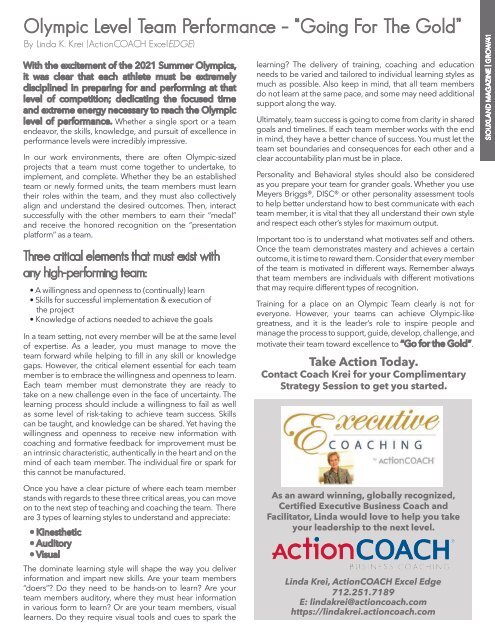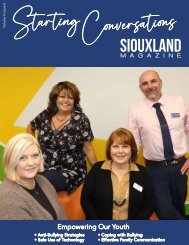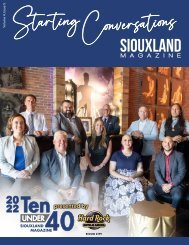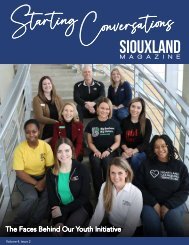Siouxland Magazine - Volume 3 Issue 5
Create successful ePaper yourself
Turn your PDF publications into a flip-book with our unique Google optimized e-Paper software.
Olympic Level Team Performance – “Going For The Gold”<br />
By Linda K. Krei (ActionCOACH ExcelEDGE)<br />
With the excitement of the 2021 Summer Olympics,<br />
it was clear that each athlete must be extremely<br />
disciplined in preparing for and performing at that<br />
level of competition; dedicating the focused time<br />
and extreme energy necessary to reach the Olympic<br />
level of performance. Whether a single sport or a team<br />
endeavor, the skills, knowledge, and pursuit of excellence in<br />
performance levels were incredibly impressive.<br />
In our work environments, there are often Olympic-sized<br />
projects that a team must come together to undertake, to<br />
implement, and complete. Whether they be an established<br />
team or newly formed units, the team members must learn<br />
their roles within the team, and they must also collectively<br />
align and understand the desired outcomes. Then, interact<br />
successfully with the other members to earn their “medal”<br />
and receive the honored recognition on the “presentation<br />
platform” as a team.<br />
Three critical elements that must exist with<br />
any high-performing team:<br />
• A willingness and openness to (continually) learn<br />
• Skills for successful implementation & execution of<br />
the project<br />
• Knowledge of actions needed to achieve the goals<br />
In a team setting, not every member will be at the same level<br />
of expertise. As a leader, you must manage to move the<br />
team forward while helping to fill in any skill or knowledge<br />
gaps. However, the critical element essential for each team<br />
member is to embrace the willingness and openness to learn.<br />
Each team member must demonstrate they are ready to<br />
take on a new challenge even in the face of uncertainty. The<br />
learning process should include a willingness to fail as well<br />
as some level of risk-taking to achieve team success. Skills<br />
can be taught, and knowledge can be shared. Yet having the<br />
willingness and openness to receive new information with<br />
coaching and formative feedback for improvement must be<br />
an intrinsic characteristic, authentically in the heart and on the<br />
mind of each team member. The individual fire or spark for<br />
this cannot be manufactured.<br />
learning? The delivery of training, coaching and education<br />
needs to be varied and tailored to individual learning styles as<br />
much as possible. Also keep in mind, that all team members<br />
do not learn at the same pace, and some may need additional<br />
support along the way.<br />
Ultimately, team success is going to come from clarity in shared<br />
goals and timelines. If each team member works with the end<br />
in mind, they have a better chance of success. You must let the<br />
team set boundaries and consequences for each other and a<br />
clear accountability plan must be in place.<br />
Personality and Behavioral styles should also be considered<br />
as you prepare your team for grander goals. Whether you use<br />
Meyers Briggs®, DISC® or other personality assessment tools<br />
to help better understand how to best communicate with each<br />
team member, it is vital that they all understand their own style<br />
and respect each other’s styles for maximum output.<br />
Important too is to understand what motivates self and others.<br />
Once the team demonstrates mastery and achieves a certain<br />
outcome, it is time to reward them. Consider that every member<br />
of the team is motivated in different ways. Remember always<br />
that team members are individuals with different motivations<br />
that may require different types of recognition.<br />
Training for a place on an Olympic Team clearly is not for<br />
everyone. However, your teams can achieve Olympic-like<br />
greatness, and it is the leader’s role to inspire people and<br />
manage the process to support, guide, develop, challenge, and<br />
motivate their team toward excellence to “Go for the Gold”.<br />
Take Action Today.<br />
Contact Coach Krei for your Complimentary<br />
Strategy Session to get you started.<br />
<strong>Siouxland</strong> <strong>Magazine</strong> | Grow/41<br />
Once you have a clear picture of where each team member<br />
stands with regards to these three critical areas, you can move<br />
on to the next step of teaching and coaching the team. There<br />
are 3 types of learning styles to understand and appreciate:<br />
• Kinesthetic<br />
• Auditory<br />
• Visual<br />
The dominate learning style will shape the way you deliver<br />
information and impart new skills. Are your team members<br />
“doers”? Do they need to be hands-on to learn? Are your<br />
team members auditory, where they must hear information<br />
in various form to learn? Or are your team members, visual<br />
learners. Do they require visual tools and cues to spark the<br />
As an award winning, globally recognized,<br />
Certified Executive Business Coach and<br />
Facilitator, Linda would love to help you take<br />
your leadership to the next level.<br />
Linda Krei, ActionCOACH Excel Edge<br />
712.251.7189<br />
E: lindakrei@actioncoach.com<br />
https://lindakrei.actioncoach.com


















